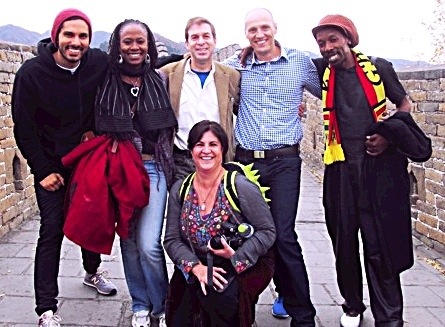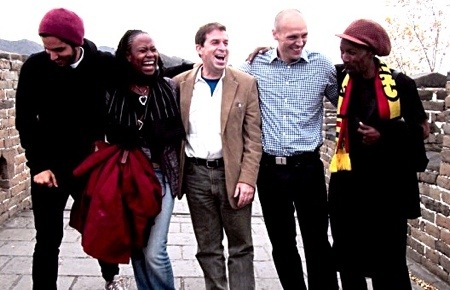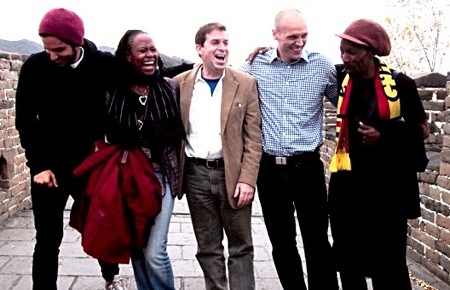
NEW YORK — Five years ago Linda Ragsdale, an artist and mother from Nashville, survived a terrrorist attack in Mumbai, India that killed 166 people. In a keynote speech at the BEIGIN H2O conference in Beijing, Linda described the orderly persistence of the attack on the hotel where she stayed. Not a soul stirred in the auditorium at the International School of Beijing as she recounted the sound, the smell, the sight of the gun barrel, and the determined and surprising empathy she felt for the attacker (he was about the same age as her son).
That gunman, neatly dressed in khakis, strode into the restaurant where she sat and unleashed bursts of bullets, like angry bees from a hive. One of them slashed through three feet of her torso. She was saved by strangers who pulled her into the restaurant kitchen and then into the back seat of a taxi that raced to the hospital. In the years since, Linda told 500 students, she’s devoted herself to founding a non-profit group, The Peace Dragon, and its signature The Peace Master Class, which helps students around the world “engage their human powers of view, voice, and choice to have a super life.” Her story, personal and riveting and inspiring, is all the more courageous because her life could be riven by resentment and revenge. “I know what a bullet can do to the human body,” Linda said. “And I’ve never held a gun.”
In early November I spent almost a week with Linda, and with four more people of accomplishment at BEIGIN 2013, a conference designed to immerse students from 42 elite international high schools from across Asia in the specifics of a dozen risks to global sustainability — among them global warming, fisheries depletion, poverty, disease, pollution, conflict, labor, deforestation, migration, weak Internet infrastructure and access, and water supply.
That’s a heavy list for the millennial generation to accept even as it’s compelled to think about solutions. It’s a dispiriting list for baby boomers. My generation developed and enforced the modern environmental policy and regulatory apparatus to limit industrial depradations in the West. We’ve been unable, though, to muster the resolve to adapt the rules to new conditions, and utterly failed to gain a grip in the developing world.
But it’s also a list that can be solved with the help of the fine young minds coming up the pike. That was the point of the BEIGIN conference, which was organized by faculty and staff at the International School of Beijing. The conference’s transactional and communications hub was a three-person team that included Simon Parker, the assistant director of student activities, and his faculty colleagues Zerlina Cheng and Brad Philen. Parker, Cheng, and Philen clearly set out to make a strong case for what the conference smartly referred to as H2O – Hope. Humanity. Opportunity.
Indeed, the world contends with all manner of environmental and economic risks, much of it caused not by a shortage of resources or of recognition, but by a desert of empathy and a barren storehouse of courage to act.
In Australia, a nation wracked by drought and water scarcity, much of it influenced by burning the nation’s abundance of coal, new elections bring to power lawmakers that are set on producing and combusting even more coal.
In India, where water supplies are draining from beneath the land and coal production is soaring to keep pace with escalating energy demand, the 700 million people connected to agriculture are provided free energy and free water as a function of 50-year-old law and policy. The national decision to drive economic growth with reckless resource policy encourages more profligate water use, much higher climate-changing coal consumption, and built-in inefficiencies that are doing the opposite of what India wants. India is producing massive food surpluses that rot in warehouses. And the country’s economy is slowing.
I could go on. More than 40 years ago my Great Lakes home region in the United States helped lead the work to enact the Clean Water Act, which scrubbed industrial and municipal pollutants out of the five big lakes. The nation acted with intelligence and persistence to enforce the law. The water got clearer, in fact much clearer. New conditions today, though, are pouring phosphorous into the lakes, leading to great blooms of toxic algae, now the most important and visible threat to the Great Lakes. But the states and the nation that embraced the Clean Water Act are politically and culturally helpless to respond to these new conditions, the result of a democracy deformed by economic fear, selfishness, and irrational ideology.
Young people today are aware of the challenges they face. What they say they need are new operating principles, an approach to engaging information and the world that leads to promise in an era of apparent peril. In choosing the conference’s keynote speakers and workshop leaders, Parker and his colleagues sought people who could help lay that kind of pragmatic intellectual and emotional foundation.
What the keynoters and workshop leaders discovered during the six days we spent together — teaching in classes, hanging out at meals, touring the Great Wall, drinking beer downtown — was that we were as open to learning from each other as the students.
It was an engrossing and inspiring experience. Along with discovering more about peace and love from Linda Ragsdale, here are the other four reasons why.
Bob Nameng. Orphaned in Soweto’s Kliptown community in South Africa as a very young boy in the 1970s, Bob was taken off the street and raised by a woman who helped manage his life in a way that he could devote all of his independence and heart to helping young people. A wonderful speaker, his talks are seasoned with memorable life lessons, about the future — “If you don’t know where you’ve been, how do you know where you’re going?” — experience — “No pain, no gain.” — and Africa’s courageous women — “You touch a woman. You touch a rock.” Bob told us about his work to start a youth program when he was 16, a program that evolved into a community center for kids and for orphans, many of whom he has legally adopted. Quiet at first as he learned about each of us, Bob steadily unwrapped himself, revealing a funny, ardent, charismatic and completely genuine man in his 40s whose life is defined by the children he raises to productive adulthood and the SKY Foundation he founded that strengthens the community’s progress.
Karima Grant, an American-born writer of Senagalese descent — also a program administrator and teacher — who lives in Dakar with her husband and four children, and where she founded ImagiNation Afrika, a non-profit determined to establish Africa’s first children’s museum. Karima’s passion for her family, her community, and her own capacity to create and lead is apparent and endearing. Her laugh, her hugs, her wellspring of compassion and intelligence form a gravity field that just draws people to her. I promised to make my first trip to Africa next year to visit Karima’s region in west Africa and Bob’s in South Africa. My goals: report on water, food, energy, and climate for Circle of Blue, and help Bob and Karima with any of the program-building, fund-raising, and communications skills I’ve amassed as founder of the non-profit Michigan Land Use Institute here in the American Midwest. I plan on making that trip in the last months of 2014.
Geoff Morgan, a Canadian educator who lives in Toronto, founded Building Walls of Wisdom in 2009, and has been busy constructing schools in impoverished rural regions of developing nations all over the world. For a globally recognized educator, a man who served for years as the principal of an international school in Abu Dhabi, Geoff is surprisingly soft spoken. His keynote speech, though, told a story of discovery that focused on a young and poor girl he met who convinced him to overcome his concerns about intruding and facing real poverty, and to follow her to meet her family. He did, and learned about the signature consequences of education in helping poor girls elevate from restrictive and grounded lives to pursue their dreams.
Luka Lesson, a young Australian poet, rapper, author, and performer whose work and career, it seems to me, is certain to make a real difference in the 21st century. Well educated, politically aware, and beautifully poised Luka showed the students and the keynoters an entirely new path to communication through magical prose, painstaking memory, and striking performance. Check out his keynote (and all the others) at the bottom of the conference Web page.The week after the BEIGIN conference Luka and a producer friend were busy recording a new album in Beijing, and he held a launch in Beijing for his new book of poetry, The Future Ancients.
I felt such kinship with Luka’s command of vocabulary and language. His capacity to peer into the complexity and translate in metaphors and phrases that grasped simplicity. As I told him, and the students during my keynote, Luka and I are of different generations, come from different continents, and use language in different ways. But at its essence, we do the same thing. We are translators. We try to make the complex simpler to understand. In a way that’s what the BEIGIN conference was all about, what the speakers are all about. I joined my colleagues in embracing Bob Nameng’s perfectly expressed summary of our time together. He said, hugging us, “You are my new family.”


Thank you for visiting my blog and for sharing Luka Lesson’s inspiring story. It’s great to see the global connections that are being made at the BEIGIN conference and to see Luka continue on with his journey. This is an empowering post. May you and your colleagues continue to make positive social change. God bless!
Thanks so much Maryanne. Good luck to you, too. Keith